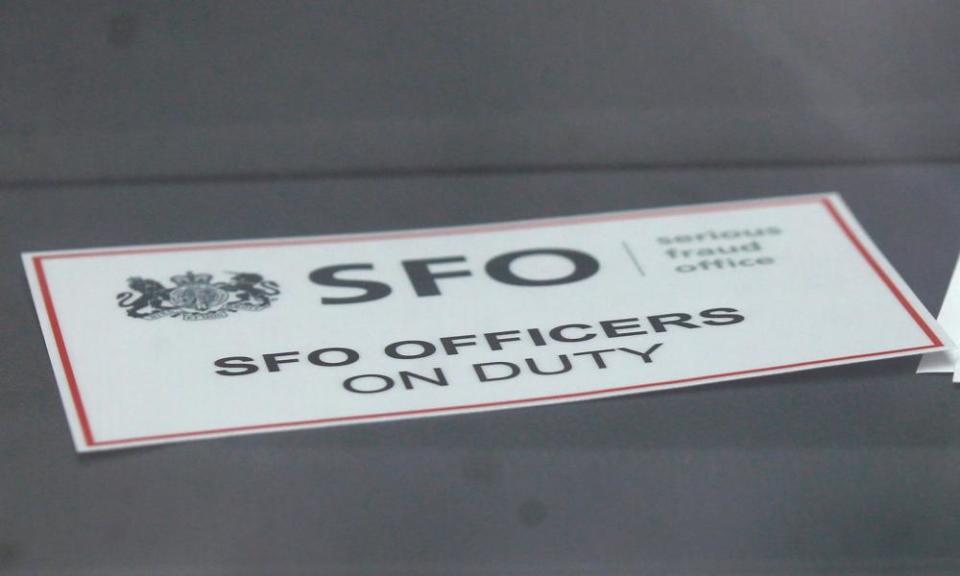Petrofac's move to appease SFO offers fuel for thought | Nils Pratley

When the Serious Fraud Office announced two weeks ago it was investigating suspected bribery, corruption and money laundering at Petrofac, shares in the oil services firm fell 14%. It was a sharp reaction to serious news, but it didn’t suggest outright panic in the ranks of investors.
One could understand why. Petrofac, a former member of the FTSE 100 index in the days of higher oil prices, is still a very big business. It has 13,500 employees, recorded revenues last year of $7.9bn (£6bn) and has an order-book of contracts worth $14.3bn.
Shareholders will also have reflected that SFO investigations tend to take ages and, even when the company admits criminal activity (which Petrofac doesn’t), the process can conclude these days with a deferred prosecution agreement, or DPA, and the payment of a financial penalty that can be chunky but not life-threatening.
That semi-reassuring view of potential risks has been undermined by Petrofac’s latest announcement. In its effort to display cooperation with the SFO, the board has suspended chief operating officer Marwan Chedid – but the prosecuting agency still seems unhappy. The SFO does not deem Petrofac to have cooperated with it “as that term is used in relevant SFO and sentencing guidelines”. The language is important: it could mean that the option of a DPA will not be offered; should events run that way.
To complete investors’ misery, Petrofac reported that the findings of its internal investigation – which concluded there was no evidence of payment of bribes – had not been accepted by the SFO. Cue a further 30% plunge in the share price. It has now halved in a fortnight.
Aside from the direct uncertainty around the SFO’s investigation, Petrofac’s day-to-day operations will be hampered by Chedid’s absence. He is righthand man to Ayman Asfari, Petrofac’s chief executive, 18% shareholder and driving force since the 1990s. And, to put it mildly, replenishing the order-book will not be made any easier by the shadow of the SFO inquiry.
Could the board have handled the crisis differently? In theory, it could also have suspended Asfari, who, like Chedid, was arrested, questioned under caution by the SFO and released without charge a fortnight ago. Two senior suspensions might have satisfied the SFO’s definition of full cooperation during an investigation.
But one can see why the board rejected that option. Asfari, with his network of contacts in the Middle East plus a role as a UK trade ambassador, is the public face of Petrofac and the man who makes the company tick. The danger of corporate meltdown would have felt real. Removing Asfari from all matters related to the SFO investigation was probably the best pragmatic fudge.
Yet, if the length of SFO investigations initially sounded helpful for Petrofac’s ability to operate normally, the logic has been turned on its head. Chedid is suspended until further notice and Asfari must try to bring in more contracts in near-impossible circumstances. This is a deep crisis and the correct share price is anybody’s guess.
Shale oil is here to stay
“We will do whatever is necessary,” declared Saudi Arabia’s energy minister before Opec’s meeting in Vienna to consider production cuts to drive up the oil price. The cartel then proceeded to do the minimum. It merely agreed to extend existing curbs until next March alongside Russia. The oil price fell 4%.
Give it time, seems to be the tune from Vienna, but it is sounding fainter. When Opec embarked on this strategy last November, it surely expected better results. The data shows there is still a glut of oil stocks in the world and a barrel of Brent now costs $52, a long way from the $60-plus that Opec would like to restore.
The cartel can keep trying – but the only thing it has proved so far is the resilience of the US shale industry.
Financial disservices
City Week is “the premier gathering of the international financial services community”, or so the blurb says, and, no doubt, important people had vital things to say about Brexit, Trump and so on.
Indeed, the organisers deemed it necessary to hold the minute’s silence for the victims of the Manchester bomb attack at 9am, and not at 11am with the rest of nation, to avoid interrupting the busy schedule. What was on the timetable at 11am? “Networking and morning coffee.”
In the afternoon, delegates jaw-boned about why it’s terribly important for financial services firms to look outside their bubbles and consider “society at large”. Of course they did.

 Yahoo Finance
Yahoo Finance 